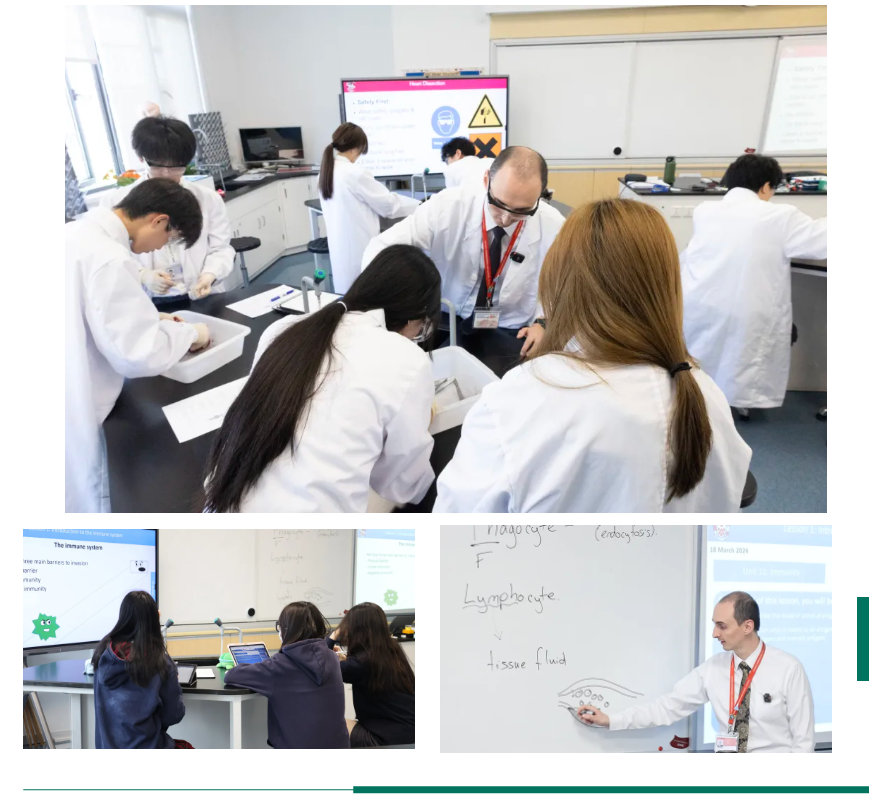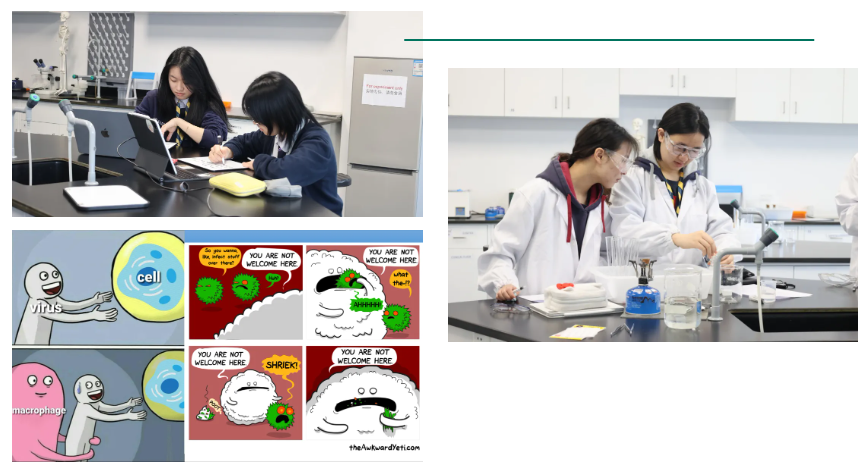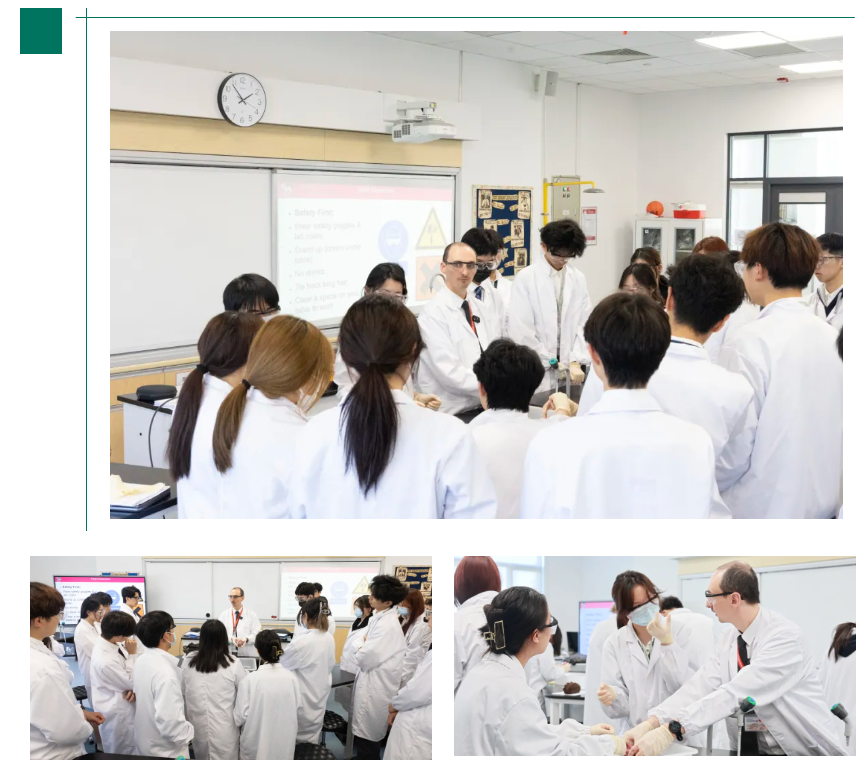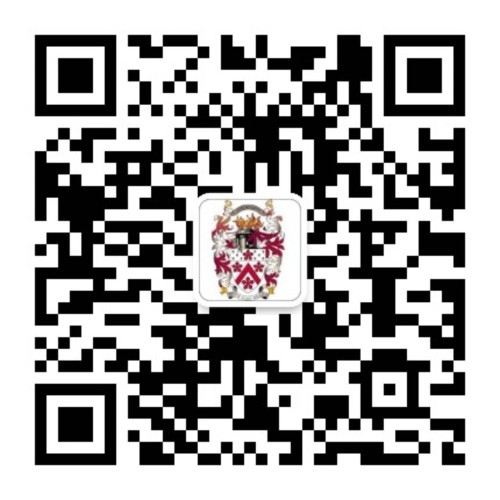Open Class Ep.14 Let's Delve into Mr Grech's Biology Class
Welcome to the final episode of the AY23-24 open class series. Today, we will step into Mr Matthew Grech's two biology lessons: a theory class on the immune system and a lab class on heart dissection. In his classroom, we will see how he makes learning an enjoyable experience, supporting students in integrating relevant knowledge and guiding them to explore and learn from one another. He is committed to creating a learning environment filled with a spirit of exploration, encouraging students to reach their full potential and improve their critical thinking skills and depth of knowledge. Now, let's experience Mr Grech's biology classes where professionalism and fun coexist!
What is the Class About?
In the Year 10 biology class, students are learning about the circulatory system of animals. Mr Grech has explained the theory of the double circulatory system and the structure of the heart, and he has also given the students the opportunity to dissect a heart! Through the heart dissection practicals, students can feel every detail of the heart and identify the structural differences between the two sides of the heart. By hands-on touching and practicing, the various structures and functions of the heart are no longer "learned on paper" - the students can deepen their understanding and commit the content to their long-term memory. For the Year 12 students, they are studying the immune system. The class starts with a review of the biology-specific terms learned previously. Mr Grech told us that, "The immune system is related to many other units we have learned this year, so it is necessary to review some key terms to help students fully understand the new content we are teaching in class."

Teaching Style
Mr Grech advocates that students learn best in an environment filled with fun. Each of his lessons begins with a warm-up activity, which not only helps students recall relevant course content but also quickly puts them into the mindset of biology learning. For example, in the immune system class, the warm-up activity is a guessing game where two teams of students describe words to their teammates in English, and the team that answers correctly first wins. This not only tests the students' understanding of the given topic and keyword and requires them to ‘teach’ it back to their classmates in a simplified manner.

Interactive teaching methods and student-led activities are the highlights of Mr Grech's classes, aimed at enhancing the students' learning experience. He encourages students to get out of their seats and challenge their understanding of a given topic through research, discussion and peer-teaching. He explained, "As a teacher, initiate student learning and guide students through new content, but students learn a huge amount from their peers." After raising a question, he provides enough time for students to think and discuss with their classmates before discussing the answers as a whole class. This approach ensures that students have the opportunity to communicate in their native language first, and then engage in deeper discussions in English.
Promoting cooperation between students is particularly prominent in the practical lessons, such as the heart dissection experiment, where students work in pairs. This allows each student to closely observe and touch the heart, have ample hands-on space, and enhance their mutual cooperation, while also learning from their peers. Mr Grech's highly interactive classes also stem from his encouragement of students to actively ask questions. He believes that "Almost always, there is at least one other student in the room who was wondering the same thing and by asking the question, students are helping their peers learn."

Furthermore, Mr Grech considers teenagers to be some of the most tech-savvy people, and in their future careers and lives, they will need to apply various and strong technology skills. Therefore, he likes to provide students with opportunities to showcase their skills, such as when assigning homework, he often requires students to create revision videos, infographics, or even memes to consolidate their learning and understanding of biology topics in a diverse and interesting way.

Education Philosophy
Mr Grech's educational philosophy is centered on exploration and discovery, and he is committed to creating a learning environment filled with a spirit of exploration for his students. He uses a variety of teaching methods to help students gain a comprehensive knowledge perspective and understand the role of different topics in the life process. He encourages students to reach their full potential and continuously deepen their understanding and thinking skills through advanced questions and extension activities.
At the beginning of each practical lesson, Mr Grech leads the students in reviewing the experimental rules for biology labs, such as the proper wearing of lab coats and goggles, the arrangement of chairs and drinks, etc. Additionally, he explains in detail the various chemicals and equipment that will be used in the experiment that day, ensuring that students know how to operate them safely. He also prints out and enlarges the hazard symbols on the experiment equipment and chemicals and evaluates student understanding and to reinforce the symbol meanings. When conducting dissection experiments, Mr Grech also emphasises the risks of bacteria and other harmful pathogens that may be present on the organic material (the experimental heart), reminding students to pay extra attention to protection.

During the experiments, Mr Grech gradually guides the students in their exploration. He explains, "Although many students are eager to start cutting the heart, they need guidance to ensure that they are able to complete the dissection in a way that the structures of the heart are easily identifiable. To this end, the experiment is carried out in stages, with students first observing my demonstration before attempting to repeat the demonstration in small groups on their heart."

Mr Grech stresses the cultivation of students' critical thinking and problem-solving skills, such as by presenting them with thought-provoking questions. He told us, " Nature is not a stand-alone concept, but involves countless inter-linked processes. To help students understand this, I include opportunities for critical thinking throughout my lessons for students to make the connections between topics and to understand how the role of one topic influences other aspects that we see in nature.”
Advice from Mr Grech
For students who want to study biology and other scientific disciplines in the future, Mr Grech advised, "Remember that in the field of science, every failure is progress. Failed experiments or tests are opportunities for self-growth and improvement!" He emphasized that if you know you are interested in a certain area of science or biology, immerse yourself in learning about it; lastly, never be afraid to ask questions.






